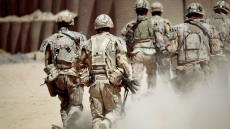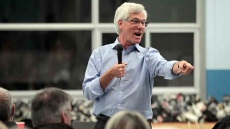WINNIPEG — Manitoba is looking at overhauling the layout of 10 emergency rooms in the province after the death of an indigenous man during a 34-hour wait.
But the family of Brian Sinclair, who died in a Winnipeg emergency room in 2008, says changing the configuration of ERs won't address the reason why the 45-year-old died without treatment.
Sinclair's death was the subject of an inquest which made 63 recommendations in December 2014 aimed primarily at policy reviews at the Winnipeg Regional Health Authority.
One involves looking at the layout of emergency rooms to ensure people waiting are visible to the triage desk. Another suggests a "pre-triage" area for patients.
The province is advertising for a consultant to examine the feasibility of those in 10 hospitals across Manitoba.
"We hope to identify any specific, technical or physical issues that are related to those recommendations," said Norman Blackie, executive director of the capital planning branch of Manitoba Health.
"They involve reviewing the physical layout of the waiting areas within those emergency departments and to determine whether there are any challenges to creating a pre-triage area."
Some of the emergency rooms may not need extensive renovation if they already adhere to the recommendations, he added.
Sinclair, a double amputee, was waiting for care at Winnipeg's Health Sciences Centre and died of a treatable bladder infection caused by a blocked catheter.
Although Sinclair spoke to a triage aide when he first arrived in the ER, he was never formally entered into the hospital's system. He languished for hours, growing sicker and vomiting several times, but was never asked if he was waiting for care.
Rigor mortis had set in by the time Sinclair was discovered dead.
The inquest heard many employees assumed he was drunk or seeking shelter. Others thought he had been seen and was waiting for a ride.
Vilko Zbogar, lawyer for the Sinclair family, says the inquest found Sinclair didn't die because people didn't know he was there. An internal review found 17 staff members saw the man, but no one assumed he was waiting for care.
"He was just ignored," Zbogar said. "People did actually see him. They just chose not to pay attention to him."
Sinclair's family pulled out of the second half of the inquest over concerns the probe was ignoring whether systemic racism played a role in his death.
They called on the judge to rule the death a homicide and asked him to recommend the Manitoba government order a public inquiry to examine indigenous people and their health care. The judge did neither.
While the layout of Manitoba's emergency rooms could perhaps use some rejigging, Zbogar said the province continues to ignore a pervasive problem with its health care.
"Those biases exist within our systems," Zbogar said. "So far the province of Manitoba, despite the inquest, has done nothing to look into those kinds of core, fundamental issues."
Health Minister Sharon Blady was not immediately available for comment.





